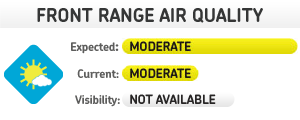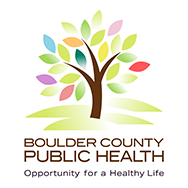Ozone
Unlike the good, protective ozone layer in the upper stratosphere, ground-level ozone is a harmful air pollutant that affects all of us.
Get Ozone Alerts
Sign up to receive ozone action alerts to get the most up-to-date information about Colorado’s Air Quality.
Health Impacts
Ozone can make lung conditions like asthma worse and can permanently damage lungs. Children, older people, and those with lung conditions are impacted most. However, ozone pollution can cause chest pains, coughing, and throat irritation in anyone, even at low levels. Before exercising or spending a lot of time outdoors on hot summer days, it’s best to check the air quality conditions in your area. And on high ozone days, do outdoor activities in the early morning or after 8 p.m.
Causes
Ozone is formed from the emissions of everyday activities like:
- Driving
- Fueling vehicles
- Painting
- Using solvent
- Mowing the lawn
- Emissions from oil and gas development, power plants, and other industrial activity
These activities emit volatile organic compounds and nitrogen oxides that when combined, “cook” in heat and sunlight to form ozone. Hot summer days often provide the perfect conditions for increased ozone pollution.
Boulder County Ozone Levels
Ozone pollution is a serious concern in the nine-county Denver Metro/North Front Range region (which includes Adams, Arapahoe, Boulder, Broomfield, Denver, Douglas, Jefferson, Larimer, and Weld Counties). The nine air quality monitors in the area often record ozone levels that exceed the EPA ozone standard, including the monitors in Boulder and Rocky Mountain National Park.
Boulder County Clean Air Panel Of Atmospheric Scientists
Boulder County Public Health and the Office of Sustainability, Climate Action, & Resilience hosted a panel discussion on January 16, 2020 to share the latest local and national data on the health impacts of climate change with a particular focus on the connection between air quality and climate change. The panel and the host for the discussion are national leaders in atmospheric climate science with expertise to speak on this important issue.
Actions to Protect Our Air
Our cars, lawn and garden equipment, and other products (e.g., paints and cleaners) are all culprits in producing ozone pollution. Ozone is a highly unstable and reactive compound. When ozone forms faster than it can break down, levels become high. Ozone levels can become high at any time, but ozone forms faster with warm temperatures, especially when summer days are hot, sunny, stifling, with little wind. Because of the geography of the Front Range, ozone levels tend to be higher in the Denver Metro Region than in other parts of Colorado.
Adjust Driving Habits
Driving is a typical person’s most air-polluting activity. Consider these options for reducing your impact on our air:
- Combine Trips: Vehicles on the road create more than 25% of all air pollution nationwide.
- Take the Bus or Carpool: The average driver spends about 56 cents per mile on their vehicle, including ownership and maintenance.
- Ride a Bike or Walk: These are simple ways to get exercise and help clear the air.
- Telecommute: Just telecommuting one day a week for a year can save the typical commuter about 1,200 miles on their vehicle and about $455 in total driving costs.
- Care for your Car: A well-maintained vehicle produces 20% less ozone-related emissions and uses less gas – saving you money.
- Check your Tires: Properly inflating your tires can save up to 18 gallons of gas per year.
- Fuel when it’s Cool: Refueling either in the morning or evening can prevent gas fumes from heating up and creating ozone.
- Don’t Top off the Tank: Topping off your tank releases gas fumes into the air canceling out the benefit of the pump’s pollution control device.
- Go Electric or Hybrid: Electric vehicles do not produce tailpipe emissions. While charging the battery may increase pollution at the power plant, total emissions associated with driving electric vehicles are still typically less than those for gasoline cars—particularly if the electricity is generated from renewable energy sources like wind or solar.
- Turn off Your Car: Idling for over 10 seconds uses more fuel than restarting your engine (idling for more than 30 seconds for diesel engines). When you turn off your engine while you wait or are parked, you:
- Reduce harmful greenhouse gas emissions and smog.
- Reduce unhealthy exhaust fumes that contribute to asthma and cardiovascular episodes.
- Use less fuel; saving fuel will save you money.
- If every US resident reduced their idling by 5 minutes a day, we could save as much as 3.8 million gallons of gasoline and reduce carbon dioxide emissions by 40,000 tons daily or 13 million tons annually.
Use Electric Gardening Equipment
Use hand or electric-powered lawn and gardening tools instead of gasoline-powered equipment. If you do use gas-powered tools wait until evening to use them or look for a lawn mower replacement event near you.
Track Trips
Tracking trips can show you the impact of your actions. Try the Way to Go tracker.
Boulder County Actions
Boulder County continuously takes steps to improve our air, including:
- Engaging at the state-level to support regulations that reduce emissions from, oil and gas development, other industrial sources, and vehicles, including adopting Clean Car Standards.
- Working with local businesses to promote alternative transportation, energy efficiency, and pollution prevention through the Partners for a Clean Environment Program.
- Working with oil and gas operators to detect leaks and follow up on needed repairs.
- Passing the strongest oil and gas regulations in Colorado.




